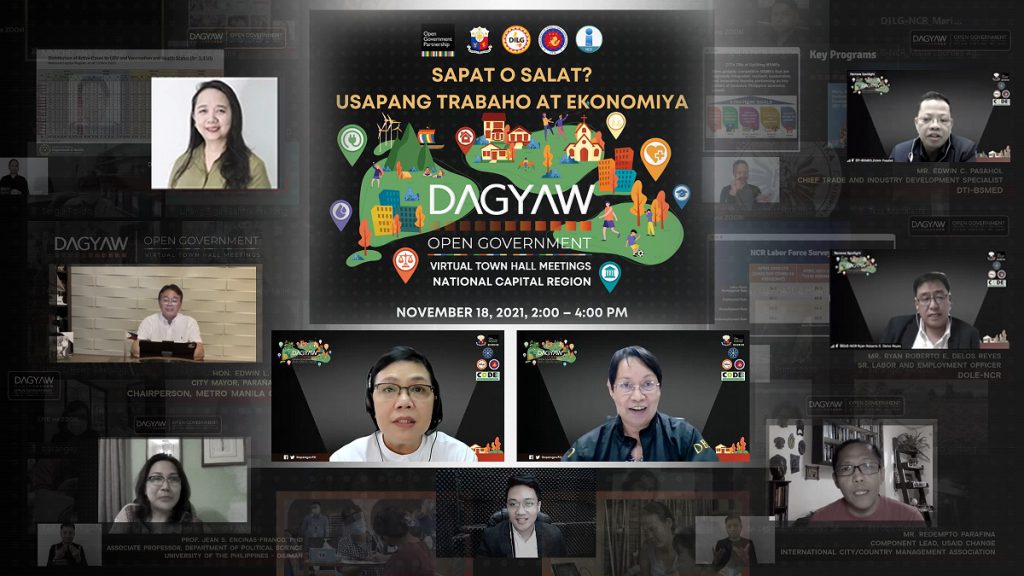
Since the pandemic began almost two years ago, the prolonged quarantine measures and strict lockdowns have taken a toll on the jobs, business activities, and social wellbeing of many Filipinos.
Mrs. Judith Garcia, president of the Samahan ng Magkakaibigan Laban sa Kahirapan from Quezon City, laments the repercussions of the pandemic in their community. She recalled that most of them lost their jobs, and small businesses are either closed or only slowly opening up now.
These are just among the many concerns that were addressed in the NCR leg of DAGYAW 2021: Open Government and Participatory Governance Virtual Town Hall Meeting entitled, âSapat o Salat? Usapang Trabaho at Ekonomiyaâ last November 18 via Zoom and Facebook Live.
Over 600 participants attended the virtual session, which highlighted issues in the sectors hardest hit by the pandemic â health, job opportunities, livelihood, and the economy.
In her message, DILG-NCR Regional Director Maria Lourdes Agustin articulated the importance of having a dialogue with the various sectors of society in intensifying the relationship between the government and the people.
âHigit sa pagpupulong, ang Dagyaw rin ay isang pagdiriwang ng ating bayanihan, at pagkilala ng ating ambag, danas, at mga tagumpay bilang isang kolektibong mamamayan,â she said in Filipino.
Representatives from various national government agencies (NGAs) shared their most recent accomplishments and ongoing interventions. Dr. Aleli Annie Grace Sudiacal, Assistant Regional Director of the Department of Health (DOH) â Metro Manila Center for
Health Development, discussed the latest COVID-19 situation in Metro Manila and how the region is faring in terms of vaccinating children aged 12-17.
Ryan Roberto Delos Reyes, Senior Labor and Employment Officer of the Department of Labor and Employment (DOLE-NCR), presented the jobs and assistance programs open to Metro Manila workers severely affected by the pandemic and how these can be availed.
Representing the Department of Trade and Industry, Chief Trade and Industry Development Specialist Edwin Pasahol shared their stimulus packages for small and medium enterprises to support the revival of economic and business activity that will herald the emergence of the new normal.
For his part, Parañaque Mayor Edwin Olivarez, the chairperson of the Metro Manila Council, talked about the cohesive responses of the LGUs in NCR and the national government to the challenges faced by their constituents, and they benefited from these interventions.
The panel of reactors consisted of Mr. Redempto Parafina, Component Lead of the USAID Cities for Enhanced Governance and Engagement (CHANGE) Project under the International City/County Management Association, and Professor Jean Encinas-Franco of the University of the Philippines. Representing civil society, Parafina acknowledged the relentless efforts of the national agencies in providing immediate assistance to families affected by the COVID-19 pandemic. However, he emphasized that there are still gaps in the system, and that there is a need to improve the governmentâs communication strategy for better implementation of programs at the grassroots level.
Furthermore, Franco discussed that while the effects of COVID-19 cut across all sectors of society, its impact still varies among Filipinos, each of whom bears their individual share of the larger crisis. This reflects differences in each personâs ability to cope with the
pandemic. Thus, the government should look beyond the figures and examine structural challenges that are causing these significant differences.
The session also served as a platform for direct engagement between the participants, speakers, and panel reactors, who had a fruitful exchange of insights and ideas.
DBM-NCR Regional Director Ruby Muro concluded the session and emphasized the importance of the active engagement of every sector of society in formulating and implementing solutions to the overwhelming challenges the country is facing.
Since 2018, the Participatory Governance Cluster has regularly conducted regional town hall meetings, which facilitated meaningful discourse between the government and the people. It intends to provide an open, neutral, and protected space for dialogue on key national and local issues.
These initiatives are under the Open Government Partnership of the DILG, the DBM and the Philippine Information Agency, and supported by other concerned government agencies. #
